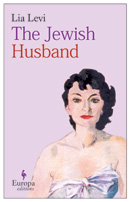

Europa Editions, paperback, 9781933372938
The Jewish Husband is a haunting, thought provoking novel about the desperate compromises made in the pursuit of love. Unconditional love collides with an increasingly prejudiced and oppressive society, and the tide of history.
The plot of The Jewish Husband revolves around a series of letters sent by an initially unnamed man, later identified as Dino Carpi, now David Katz, a teacher, living in a Tel Aviv apartment inherited from his parents. He is an Italian Jew who emigrated to Israel at the start of the Second World War and became a pioneer on an early Kibbutz community. Initially, we don't know who Dino is writing to, but we know that Dino survived the war with his parents.
Setting the scene in his first letter in 1930 Rome, we are introduced to the Auberge della Magnolia, run by Dino's parents, where Dino grew up. 1930s Italy was a police state under the control of Benito Mussolini and the National Fascist Party. Dino is about 30 years old; he is bookish, does not observe Jewish religious rites save for Yom Kippur, and he describes himself as "a twice a year jew". Dino teaches classics at a primary school, but has loftier ambitions to translate the eclectic Greek poet, Pindar.
One evening, Dino is called to an emergency downstairs at the hotel, where a girl has fallen off the revolving dance floor during a party. Dino sees Sonia Gentile for the first time—"She was beautiful. In her luminescent grey and silver evening gown she looked like a mermaid caught in a net"—and falls in love at first sight. Dino pursues Sonia secretly, and in time she reciprocates his love.
Sonia's family are members of the Italian bourgeois Catholic élite who are supportive of the fascist regime. Into this maelstrom, Dino and Sonia approach her father for permission to marry. Permission is granted so long as Dino marries Sonia in a Catholic ceremony, known as a Pauline marriage, and that Dino effectively renounces his Jewishness. In his powerful position, Sonia's father, Guiseppe Gentile, cruelly insists that Dino submits to these rules, and Sonia plays along.
On reflection Dino knows that his happiness is tenuous, that his unhappiness is never far away, "Without light and darkness, without the chiaroscuro of dawn and the shadows of sunset, the sun alone would not be able to make the flowers bloom".
How beautiful!
On this basis, Dino is reluctantly accepted into his wife's family and they have a son, Michele. As the years pass, the treatment of Italian Jews deteriorates significantly as Mussolini accepts Hitler's manifesto stating that "Aryans" are racially superior. Dino's life is progressively undermined to the point where he can no longer work and his marriage to Sonia is decreed never to have existed. In 1938 the world is hurtling towards war; staring into the abyss, Dino tries to save what is left.
When Dino has already abandoned his identity and his dignity for love, to then—under pressure—willingly abandon this love a second time is devastating. Lia Levi's writing is beautiful and spare; the book is not too long at just over 200 pages. This book is totally unlike anything else I have read in its dissection of this doomed marriage and the unimaginable sacrifices made by a man in the name of love. Even seven days after finishing the book I am still thinking about it.
I am sure Dino Carpi would be happy to find out that Pindar has now been translated from the Greek. Pindar wrote something in his poem "Pythian 8" that sums it up for me,
What is he not? A dream of a shadow
Is our mortal being.
I will certainly be searching out more of Lia Levi's fiction, although I doubt that anything can
improve upon this novel.
Read an interview with author Lia Levi in this issue.